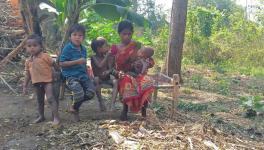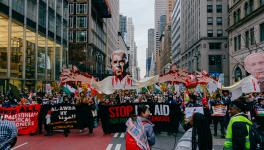Patent Rights on Medicines and Vaccines Must be Waived Off and Public Sector Pharma Companies Revived
AS the world is passing through the COVID Pandemic, vaccination seems to be the only answer to deal with it. The process has to be carried out simultaneously at the global level to achieve an early end to the pandemic. This is important because the movement of people from one country to another cannot be stopped for very long.
While developed countries have been able to vaccinate in substantial numbers, most developing countries are finding it hard to procure vaccines in required numbers.
Affluent countries booked vaccines much early. Under these circumstances, several developing countries including India are now unable to get vaccines now from companies in other countries.
It is also important to note that a maximum number of people should be vaccinated in a short span of time to ensure herd immunity which is expected to be reached if 60% – 70% population is immunised.
The high cost and unavailability of medicines is another serious issue of concern. It is highly distressing to see people running from pillar to post in search of oxygen and essential medicines such as steroids which are lifesaving in COVID.
In this connection, the 74th World Health Assembly (WHA) on 24th May 2021 called for a concrete action plan and coordinated strategies to control the pandemic. The WHA statement said that “where countries have struggled to implement effective COVID-19 control, political leadership has often undermined the critical role of skilled frontline professionals. The greatest success has been achieved between the government, professionals, trade unions, and communities working together with a high level of mutual trust. Where this has occurred there has been an important increased control of the virus allowing countries to resume freedoms and functional economies”.
The WHA in the statement called on World Health Organization (WHO) and its member states to take action to:
- Ensure that treatments and vaccines are available to everyone everywhere. This requires establishing multidisciplinary engagement with local up to cross-borders social protection systems to reach all people.
- Transform COVAX into a COVID-19 Solidarity Pooling Platform, enabling knowledge sharing as well as boosting production capacity under a public health-driven alliance of vaccine manufacturers, dedicated to research, development, manufacturing, and supply of high-quality, efficient, safe and sustainable vaccines and treatments.
- Increase preparedness including health literacy while decreasing vulnerability to future pandemics through reducing health and social inequalities that have undermined the current interventions in controlling this pandemic.
- Establish a clear partnership between the politicians and the professionals from areas like health, social organisations, and trade unions to build public trust and engagement.
The statement which has been signed by International Physicians for the Prevention of Nuclear War, World Federation of Public Health Associations, International Federation on Ageing, International Hospital Federation, World Organisation of Family Doctors, World Federation of Occupational Therapists, International League of Dermatological Societies called on member states to build their strategies on the human rights-based approach to guarantee equal access to the highest attainable standard of health, to build concrete, healthy, socially equitable, and environmentally sustainable solutions for the short and long term.
It is important that the developing countries get to produce medicines and vaccines on their own at affordable costs.
There was a time when India was a hub of cheap medicines supply not only to developing countries but also countries in Europe. But after the introduction of TRIPS under the World Trade Organisation (WTO) rules the situation changed entirely. Members of the WTO, countries are bound to agree on 18 specific points in the agreement. The Trade-Related Aspects of Intellectual Property Rights (TRIPS) is the most important one in the context of the pharmaceutical sector and access to medicines.
Under the TRIPS Agreement, WTO Members are bound to provide protection for a minimum term of 20 years from the filing date of a patent application for any invention including for a pharmaceutical product or process. Prior to the TRIPS Agreement, patent duration was significantly shorter in many countries. For example, both developed and developing countries provided for patent terms ranging from 15 to 17 years, whilst in certain developing countries, patents were granted for shorter terms of 5 to 7 years.
The TRIPS Agreement also requires countries to provide patent protection for both processes and products, in all fields of technology.
Before TRIPS, many countries provided the only process — but not product patents. Product patents provide for absolute protection of the product, whereas process patents provide protection in respect of the technology and the process or method of manufacture. These clauses created constraints for the pharmaceutical companies to produce generic medicines thus leading to the high cost of medicines.
However, TRIPS also contains provisions that allow a degree of flexibility and sufficient room for countries to accommodate their own patent and intellectual property systems and developmental needs.
This means countries have a certain amount of freedom in modifying their regulations and, various options exist for them in formulating their national legislation to ensure a proper balance between the goal of providing incentives for future inventions of new drugs and the goal of affordable access to existing medicines. This however requires political will in the leadership of the time.
Dr Vandana Shiva, a crusader for equity in trade practices and abolition of patent laws in medicine and agriculture warned that it is not just the medicines or the vaccines, the Multinational Corporations (MNCs) have patented each and every product.
It is astonishing to note that even the bacteria and viruses including the Corona Virus have been patented. Such patenting denies the right of a person, a community or country over its own produce. She has contended the claim of the MNCs that they are doing research and so have the right to earn profit. Most of the research done worldwide is by the Public institutions and through public funding, she says.
Bill Gates who till date had the image of a philanthropist stands exposed as a thoroughly insensitive businessman who wants to make huge profit in this hour of global health crises by denying the transfer of vaccine technology to the developing countries.
This has to be changed through public movements and the governments have to be forced not to work under the diktats of corporations or personalities like Bill Gates.
The patent rights on vaccines and medicines have to be waived off to save and promote the health of the people globally particularly during this crisis of the Pandemic. It is high time the Indian government rejuvenates the public institutions which produced medicines and vaccines and that have a commendable track record of serving the nation during health calamities in the past.
(IPA Service)
Originally Published in The Leaflet
Get the latest reports & analysis with people's perspective on Protests, movements & deep analytical videos, discussions of the current affairs in your Telegram app. Subscribe to NewsClick's Telegram channel & get Real-Time updates on stories, as they get published on our website.
























